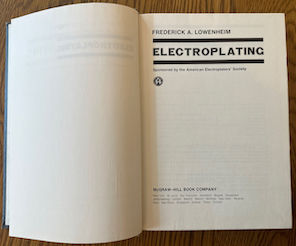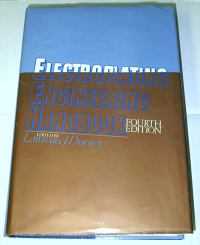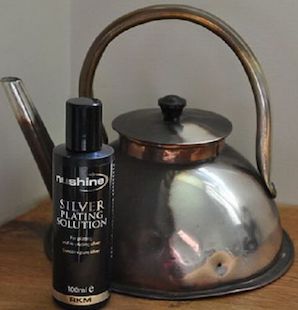
-----
Science project: will electroplating work with liquids other than water?
Q. I am a student in sixth grade and I have to do a science project. For my topic I picked electroplating and I need to know whether or not plating works with liquids other than the usual formula (cyanide, vinegar, water, epsom salt, etc.) I want to know if it works with, for example, juice, vinegar
⇦in bulk on
eBay
or
Amazon [affil link] , blah blah blah, etc., etc., etc., ... and if it does I need to know if anyone ever did a similar project/experiment, and if they did it, who did it and at what sites may I find that type of information. The reason I need this information is for a research report that is also part of my project. I am utterly serious and need a quick reply.
Please respond!
STUDENT - New York, New York, United States of America
2005
2005
A. Hi, Aleksey. Your question is really tough for 6th grade! And it's fine to ask for help when you've reached a stumbling point, but I don't think you've really thought your question through yet, and that is the heart of learning. After you truly understand the question you can seek answers, but at this point you are mixing words like "usual" into your question in a vague & unscientific fashion; and naming vinegar as a "usual" solvent, then also saying it is an unusual one...
In order to electroplate something you need to have a solution that is electrically conductive and is capable of dissolving the metal in question; once these two conditions are met, you can turn a metal into and ion and transport the ion, and possibly electroplate it out.
But metals won't dissolve at neutral pH, you need either acid or alkali to dissolve them. And oil would not work because it doesn't conduct electricity; sugar water would not work because it can't dissolve metal because it is neutral pH. But almost any acid (including lemon juice, vinegar, or soda) or almost any alkali dissolved in water is usable for electroplating of at least some metals for a science project. Please see our FAQ, "How Electroplating Works" for instructions on plating pennies with zinc or quarters with copper. Although very impractical for school science projects, molten salts, ionic solutions, and certain polar solvents can also be used for electroplating.
It is NOT a good idea to experiment with ammonia, bleach, or household cleaners though; those can be quite dangerous.
Good luck!

Ted Mooney, P.E.
Striving to live Aloha
finishing.com - Pine Beach, New Jersey
Ted is available for instant help
or longer-term assistance.
by Steve Spangler

on eBay or Amazon
or AbeBooks
(affil link)
Aleksey, electroplating is complex subject and for the main, the only common chemical to most electroplating systems is water. The reason you see other materials such as vinegar and epsom salt
[affil link] mentioned is only because they are easily available and will do a required job to a greater or lesser extent. I would sincerely hope that cyanide is not a
"usual formula" chemical in your life - it has a habit of killing people!
The subject you are researching has been well covered on this site, so if you go into the archives, you will find a veritable feast of information to help you!

Trevor Crichton
R&D practical scientist
Chesham, Bucks, UK
2005
Q. I am 77 years old and am trying to replate some antique salt & pepper shakers. It seems to me way back in high school in Michigan we electro plated pennies and nickels, with silver.
It has been so long that I don't remember how we did it and I don't seem to be able to locate the answer in the internet either. Can you help?
Thanks
- Bonita Springs, Florida, USA
2005
A. Hi, Nathan. The best thing to do if the antiques are important to you is to send them to a plating shop for replating. The kind of plating that we teach students here is for the purpose of helping them understand chemical and electrochemical principles without using any dangerous chemicals; it is nothing like real industrial electroplating in terms of brightness, thickness, adhesion, wear resistance, etc. "Real" plating usually involves very strong, noxious, regulated (and sometimes carcinogenic) chemicals. Silver plating usually involves deadly cyanide-based solutions.
But if the shakers are copper or brass it may be possible to deposit silver on them at home with readily available commercial products rather than via actual electroplating. Please see our FAQ, "Silver Plating at Home", and see if it is helpful to you. Good luck!
Regards,

Ted Mooney, P.E.
Striving to live Aloha
finishing.com - Pine Beach, New Jersey
Ted is available for instant help
or longer-term assistance.
Q. Which conducting liquids are the best for electroplating copper over a steel pen cap please let me know, I have a school project of electroplating
Jasjot Singh Ubee- Ludhiana, Punjab, India
December 9, 2019
A. Hello Jasjot. Here in the USA students from 2nd grade to 12th grade and beyond do electroplating science projects, but they do them differently depending on whether they've been in school for two years or twelve. And some times it's a research project and other times a demonstration project. So it's hard to know the best starting point for you.
If you are a younger student who must do a demonstration, please see our FAQ ""How Electroplating Works" for practical experiments as well as theory -- but you should try to do the copper plating onto something made of nickel, silver, or brass, not steel. If you are an advanced student and absolutely must do the electroplating onto steel, or you are just looking for theory and will not be attempting an experiment, get back to us please because that requires cyanide or pyrophosphate copper plating and is too dangerous and/or difficult for younger students. Good luck.
Regards,

Ted Mooney, P.E. RET
Striving to live Aloha
finishing.com - Pine Beach, New Jersey
Ted is available for instant help
or longer-term assistance.
December 2019
Q, A, or Comment on THIS thread -or- Start a NEW Thread


 on eBay
on eBay